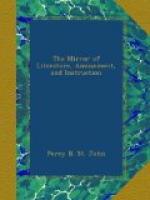P.T.W.
* * * * *
INDEPENDENCE OF PORTUGAL.
(For the Mirror.)
Portugal was first created into a monarchy on the 27th of July, 1139; on which day, Dom Alphonso I., son of Henry, Count of Burgundy, the son of Robert, king of France, was proclaimed at Lisbon, after having vanquished and slain five Moorish kings in the battle of Campo d’Ourique, where he was unanimously chosen as sovereign of Portugal by his army. This dignity was confirmed to him by the first assembly of the states-general at Lamego. In commemoration of this event, the Portuguese arms bear five standards and five escudets.[1] After the unfortunate expedition of Dom Sebastian I. to Africa, where he was slain in the battle of Alcazar, the crown devolved upon his great uncle, the Cardinal Dom Henry, a man of 67 years of age, and who reigned but 17 months. At his death there were several claimants for the succession, and the kingdom in consequence became the theatre of civil war. Philip II. of Spain, the most powerful of these, sent an army, under the Duke of Alba, into Portugal, and completed the conquest of the country with little opposition. This event took place in the year 1580, and the kingdom of Portugal remained under the dominion of Spain until the 1st of December, 1649, the day on which the Duke of Braganza was proclaimed king with the title of Dom Joao iv. Since that time Portugal has maintained its independence. For a more detailed account, see L’Abbe Nertot’s “Revolutions of Portugal.”




